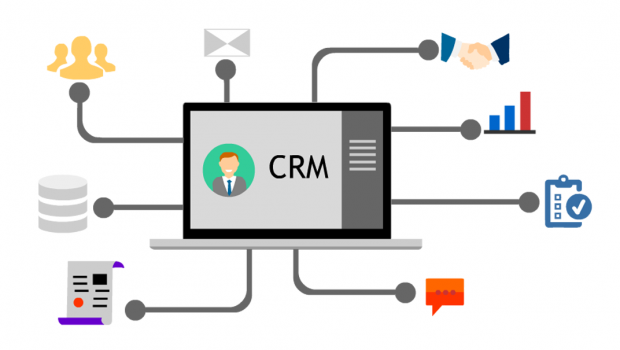Dynamics CRM and Dynamics AX CRM: Which Is Highly Worth?
Most often, people get confused between Microsoft Dynamics CRM and Dynamics AX CRM as they always sound pretty alike. Both applications offer support for most widely-known customer-facing business processes such as marketing, sales, and services, to the most commonly used functional areas like accounting, finance, operations, quality control, and project management. However, in reality, when we take a closer look, we would be able to observe more peculiar differences as against similarities. Irrespective of the fact that both applications are the most popular products of tech-giant Microsoft Dynamics CRM services is a complete CRM system which offers marketing, sales, and service associated business solutions exclusively, whereas Dynamics AX is a standalone ERP system that can be used for streamlining of processes such as warehousing, accounting, finance, operations, HR, and logistics.
Being a significant member of comprehensive Dynamics AX ERP, the Dynamics AX CRM enables deep integration along with the rest of modules and features associated with product configuration, project management, flexible pricing, and service management competencies. However, it does lack numerous traditional advantages that have been offered by familiar CRM applications such as the usability of connected/disconnected components, native Outlook integration, and the effective handling of some processes linked to sales orders and post-sales service.
In other words, Dynamics AX CRM covers most of the functional features for handing Opportunities, Quotations, Activities, Sales Orders, and much more offered by traditional CRM systems, including Dynamics CRM. However, the manner in which these functionalities works, isolates it completely from the other applications. For example, usually, Dynamics AX CRM prefers Dynamics AX for sharing the valuable data, however on the other hand, while to share data with other systems or to utilize few other functionalities that were not supported by this application one needs to develop new functionality through custom coding.
Apart from these dissimilarities, there are several major differences that distinguish these two systems from one another.
Analysis Of Key Comparisons
- Options for Deployment: Dynamics CRM services best fits for on-premise, cloud, or partner hosted platforms, while Dynamics AX CRM is more suitable for on-premise or partner hosted platforms.
- User/UX Adoption: Dynamics CRM is a consumer-oriented or office-fluent web application and delivers highly customized as well as relevant experience, while Dynamics AX CRM resembles desktop/fat-client interface and is regarded as one of the high-performance systems.
- Marketing: Dynamics CRM offers some of the advanced features such as enriched market segmentation, campaign templates, lead assignments, conversion/response track-down, data deduplication, as well as ROI/ROMI reporting. In addition, its smoother integration with MarketingPilot delivers higher-grade Marketing Resource Management competencies, whereas Dynamics AX CRM supports core marketing features such as target lists, campaign profiles, elementary reporting, and simple distributions.
- Sales: Dynamics CRM is capable of handling every process linked with SFA and provides higher flexibility in terms of well-defined sales cycle management, customizable custom controls, goal/team management, workflow tools for process automation, and excellent visual reporting. Furthermore, mobile CRM and offline operation are some of the powerful features of this application. On the other hand, Dynamics AX CRM efficiently handles the fundamentals of accounting and contact management, pipeline/forecast reporting, and opportunity management. The unique features of this application include strongest ERP integration and product configurator along with support for analyzing complex price lists.
- Service: Best suitable for helpdesks, contact centers, and call centers to deliver excellent customer service, Dynamics CRM enables case/incident management, queue management, escalations, business rules, and comprehensive reporting. While, Dynamics AX CRM emphasizes on service management and provides greater integration along with inventory materials for post-sale service requests and best field service, customer contract agreements, technical support dispatching, and generation of invoices.
- Outlook Integration: Dynamics CRM allows real-time integration in addition to complete email synchronization. Also, it supports the access to whole CRM through Outlook and sending of automated emails to the prospective leads. Dynamics AX CRM permits batch integration for synchronizing contacts, tasks, appointments, and emails (single-way integration with Outlook).
- SharePoint Integration: Dynamics CRM supports document management, whereas Dynamics AX CRM backs dashboards, role centres, reports, and document management.
- Reporting: Dynamics CRM supports comprehensive reporting through dynamic dashboards and business intelligence, while Dynamics AX CRM supports only elementary dashboards.
- Development Platform: The .Net can be used for developing Dynamics CRM, while customizations associated with Dynamics AX CRM can be done with the help of an Integrated Development Environment.
- Additional MS Integration: Dynamics CRM facilitates integration with Bing Maps, Yammer, Lync, and Skype, while Dynamics AX CRM support merely Bing Maps. Additionally, Dynamics CRM supports social media integration, however, it is limited to its in-house social network.
- Flexibility: Dynamics CRM permits easier configuration as well as customization of application as per the client’s requirements with the assistance of the xRM system, while, Dynamics AX CRM allows customization only. Moreover, Dynamics CRM can be operated through pre-built mobile and tablet platforms (Surface, Android, and iPad) that facilitates smooth synchronization while the well-built SQL database duplication allows working even offline.
- Upgradation: Dynamics CRM requires quarterly upgradation to realize its full potential, while Dynamics AX CRM needs upgradation on yearly basis.
- Duplicate Records: By creating virtual firms, Dynamics AX CRM can easily extend the functionality of duplicate detection, which identifies duplicate records by utilizing the Global Address Book.
- Opportunity Management: Both Dynamics CRM and Dynamics AX CRM are capable of distinguishing “leads” among various types of customers and/or prospects. In addition, both these products offer the latest features for handling activities surrounding opportunity management.
Take Away
Both are the products of Microsoft Corporation and offers flexible business solutions to suit each and every requirement of an organization. The numerous advantages that offered by these applications include cost-effectiveness, full functionality, greater accessibility, improved flexibility, and built-in analytics to drive greater efficiencies. Choose the right stand-alone application for your business and achieve higher efficiency.















